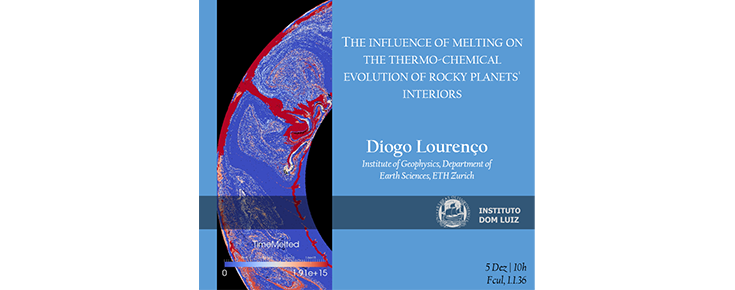
Por Diogo Lourenço (Institute of Geophysics, Department of Earth Sciences, ETH Zurich).
Melting has always been present throughout the history of the Earth, and especially early in its evolution. However, many unknowns still remain regarding its role in the dynamics of our planet. In this presentation I will show results that contribute to the developing understanding of the effects of melting on the thermo-chemical evolution of rocky bodies, with a special focus on the history of Earth, from its molten early days (magma ocean stage) to the present solid-state convection and plate tectonics. To achieve this, I performed numerical simulations of global mantle convection, and combine the numerical results with insights from scaling analysis to explore some fundamental aspects of the effects of melting on the thermo-chemical evolution of terrestrial bodies. I applied the models to investigate (i) how does melting-induced crustal production affects the interior state and surface behaviour of an Earth-like planet, (ii) the effects of intrusive versus extrusive magmatism on the surface tectonics and mantle cooling of a terrestrial planet, and (iii) the evolution of the Earth from a molten initial state to present-day solid-state convection and plate tectonics.
Results show that (i) melting-induced crustal production helps plate tectonics on Earth-like planets by strongly enhancing the mobility of the lid, replacing a stagnant lid with an episodic lid, or greatly extending the time in which a smoothly evolving mobile lid is present; (ii) high intrusion efficiencies (i.e. dominance of intrusion versus extrusion) lead to a new tectonic regime, named “plutonic-squishy lid”characterised by a set of strong plates separated by warm and weak regions generated by plutonism, and can cool the mantle more efficiently than volcanic eruptions for planets with no subduction in their history; (iii) for the early evolution of the Earth, results show rapid cooling and crystallisation until the rheological transition (transition to a solid-dominated regime with completely different properties and dynamics) then much slower crystallisation, large-scale overturn well before full solidification, and the formation and subduction of an early crust while a partially-molten upper mantle is still present. Then, the planet transitions to a mostly-solid-state long-term mantle convection and plate tectonics or an episodic-lid regime.

















